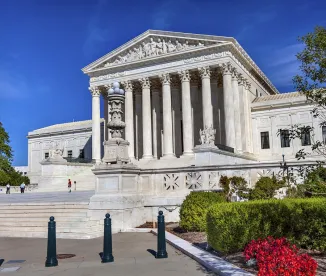On January 11, 2019, the Supreme Court granted a petition for writ of certiorari over an Eighth Circuit decision involving Exemption 4 of the Freedom of Information Act (“FOIA”), which protects from public disclosure “trade secrets and commercial or financial information obtained from a person and privileged or confidential.” This marks the first time the Supreme Court has agreed to hear a case involving this important exemption.
The case – Argus Leader Media v. U.S. Department of Agriculture, 889 F.3d 914 (8th Cir. 2018), cert. granted, — S. Ct. —-, 2019 WL 166877 (U.S. Jan. 11, 2019) (No. 18-481) – involves a FOIA request made by Argus Leader Media, a South Dakota newspaper, to the U.S. Department of Agriculture (“USDA”), seeking the yearly Supplemental Nutrition Assistance Program (“SNAP”) sales figures for every grocery store participating in the program. SNAP, formerly known as the Food Stamp Program, is the federal aid program that provides food-purchasing assistance for low- and no-income people living in the United States. The USDA issues SNAP participants a debit-like card that they use to buy food from participating retailers. When a participant buys food using their SNAP card, the USDA receives a record of that transaction, called a SNAP redemption. It was the yearly totals of these redemptions that Argus sought in its FOIA request to the USDA.
The USDA refused to release the SNAP redemption data, citing FOIA Exemption 4. Argus filed suit, resulting in the trial court ruling in its favor. Although the USDA declined to appeal, Food Marketing Institute (“FMI”) – a trade group representing grocery retailers – decided to intervene and file an appeal to the Eighth Circuit. The Circuit Court affirmed the trial court’s ruling, finding the redemption information was not “confidential” information entitled to protection under the exemption. In so ruling, the Circuit Court applied the test first enunciated in the D.C. Circuit case of National Parks & Conservation Assoc. v. Morton, 498 F.2d 765 (D.C. Cir. 1974). Under this test, commercial or financial information is “confidential” for the purposes of FOIA Exemption 4 only if disclosure is likely (1) to impair the Government’s ability to obtain necessary information in the future; or (2) to cause substantial harm to the competitive position of the person from whom the information was obtained.
Before the trial court, the USDA argued the competitive position prong of the National Parks test applied. On appeal, the Eighth Circuit agreed with the trial court that the SNAP redemption data did not satisfy this prong. Specifically, although the redemption data could be commercially useful, the Circuit Court found that was not enough to show FMI’s members would experience a substantial likelihood of competitive harm. As to FMI’s argument that its members would suffer competitive harm from the stigma associated with SNAP, the Circuit Court found this argument to be speculative and not supported by any other evidence in the record. Finally, in a footnote, the Eighth Circuit addressed FMI’s argument that the National Parks test should be abandoned in favor of a standard that applies the dictionary definition of “confidential” as meaning “secret.” The Circuit Court rejected this argument, stating “[u]nder [this] reading, Exemption 4 would swallow FOIA nearly whole.”
It is this final point that could have the greatest implications on appeal before the Supreme Court. Government contractors – many of whom have no choice but to deliver confidential information to the Government in their proposals and under data rights clauses in their contracts – could gain a significant advantage in having their information more broadly protected from disclosure to their competitors should the Supreme Court reject the National Parks test in favor of a plain meaning definition of “confidential” as “secret.” If a plain meaning test were to prevail, agencies would be required to shield information that contractors keep secret from the public and from companies seeking to use the FOIA request process as a means of to obtain otherwise unavailable competitive information, without the Government having to demonstrate how disclosure would impair the Government’s ability to obtain necessary information in the future or cause “substantial” competitive harm.
The Supreme Court’s adoption of a plain meaning test also would eliminate the many jurisdictional divisions afflicting the application of the National Parks test. Particularly, some courts only apply National Parks when information is “required” to be provided to the Government, as opposed to when information is “voluntarily” submitted. What constitutes a “required” disclosure versus a “voluntary” submission in the Government contracting context is the subject of even further disagreement. The Supreme Court’s adoption of a plain meaning definition of “confidential” as “secret” would do away with these distinctions.
Regardless of how it ultimately rules, the Supreme Court’s decision in FMI is likely to affect the Government’s application of FOIA Exemption 4 for years to come. Consequently, Government contractors should stay tuned and track developments in FMI closely.




 />i
/>i

